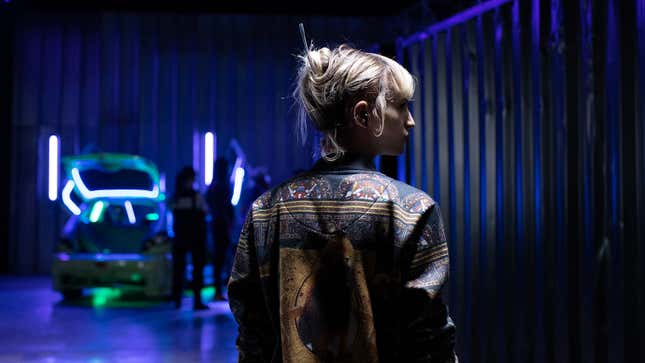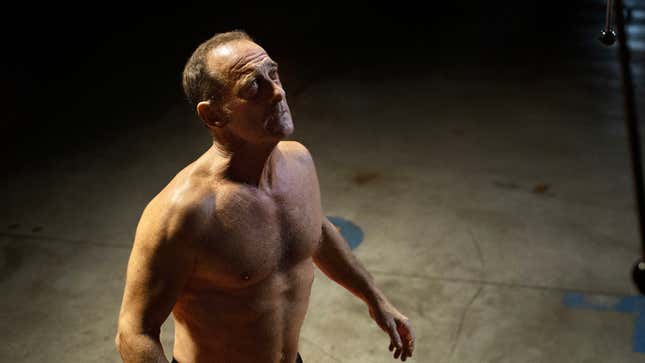French Shocker Titane Finds Love in a Hopeless Place
The movie's director and actors discuss the film about a woman serial killer with a certain fondness for cars
EntertainmentMovies

Titane, Julia Ducournau’s follow-up to her notorious 2016 cannibal film Raw, was called “the most shocking film of 2021” by the BBC earlier this year when it played the Cannes film festival (it eventually won the fest’s top prize, the Palme d’Or). The French film jolts via violent outbursts and body horror, but also in the overall unpredictability of its narrative: part of the great fun of watching Titane (named after the French word for “titanium”) is not knowing what turns it will take from scene to scene. The film’s official synopsis used in its marketing blatantly sidesteps summary—“Titane: A metal highly resistant to heat and corrosion, with high tensile strength alloys, often used in medical prostheses due to its pronounced biocompatibility.”
“You not knowing what’s going to happen in the next scene is just putting you through my character’s POV and trying to feel what she feels or to feel what he feels,” Ducournau told Jezebel this week at New York’s Conrad Midtown hotel, while she and her actors were in town for the New York Film Festival. “And that’s not like just some kind of whim or anything. It’s essential for you to feel the emotion and especially the love at the end that I want you to feel.” She said that some time during the drafting of her script, she abandoned a traditional three-act structure and “started seeing my film as like an ascending arrow.” And like any arrow worth shooting, Ducournau intended hers to strike.
It worked. We talked the day after the day after Titane played the NYFF to rapturous response. The reaction to the challenging and frequently hyper-violent movie is heartening to Ducournau, but not exactly surprising. “I have a huge trust in the audience, otherwise I wouldn’t be making movies at all and not these movies in particular,” she said. “But it’s still a big relief and enjoy because it means somehow you’ve been understood in a way that you would not necessarily expect.” Ducournau said that while she is proud of her big Cannes win, and that she recognizes the historical significance of being only the second woman in the festival’s history to win the Palme d’Or (Jane Campion won in 1993 for The Piano), she was insulted when in its wake she received questions insinuating that she won simply because she’s a woman.
The movie, which opens in U.S. theaters Friday, arrives on these shores with a certain reputation. Titane has been described as a story about a woman serial killer who fucks cars, but that barely scratches its metallic surface. Without giving too much away and lessening the film’s impact, its brooding central character Alexia (newcomer Agathe Rousselle) performs a brutal rampage, flees her home, and assumes the identity of a missing boy, whose father, Vincent (veteran French actor Vincent Lindon) is all too willing to accept her as his son. Under the guise of Adrien, Alexia is a non-speaking, bound-up, ticking time bomb.I wondered how Titane’s writer/director and stars describe the movie to people who haven’t yet seen it. (Okay, I was just looking for a shortcut to drive us through the preceding paragraph.)
-

-

-

-

-

-

-

-

-

-

-

-

-

-

-

-

-

-

-

-

-

-

-

-

-

-

-

-

-

-

-

-

-

-

-

-

-

-

-

-









































